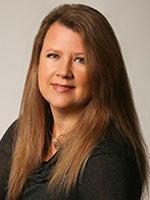
Outstanding Faculty Mentors

Mirka Koro
In my current role as the director of doctoral programs, I facilitate mentoring and productive relationships between the faculty and students daily. Advocating for students and bringing faculty and students together through various initiatives form a core of my activities as the director. In my own academic life, I also work very closely with my students and mentees and include them in my scholarly and teaching activities as often as I can. I don’t just mentor my own doctoral and graduate students, but also students of other professors and scholars who are interested in qualitative research. I invite students from my classes, writing and reading groups, and from conferences and professional meetings to collaborate. Many of my mentoring relationships morph into lifelong collaborations and intensive scholarly connections.
Throughout my career, I have provided research opportunities and assistantships for many of my mentees, and I have used grant funding to provide tuition and travel assistance so that mentees were able to present at conferences and networking events. I have 63 student co-authors in 51 refereed publications and I have presented with over 50 students in international and national conferences. To date, I have chaired and co-chaired 15 completed dissertations. I have mentees within US, Scandinavia, Australia, and New Zealand. Many of my mentees have been women, international students, and students with a minority status. Besides serving on over 100 dissertation committees across disciplines and colleges, I have also organized and co-organized a qualitative support group for graduate students and faculty members since 2002. This group, which has taken diverse formats throughout the years, meets weekly or bi-weekly to discuss theoretical and methodological issues related to qualitative research. A part of this kind mentoring is to actively engage and enhance scholarship, read and collectively discuss seminal pieces in the field, and provide feedback related to mentees’ and faculty members’ on-going qualitative research projects. I have also mentored students at Barrett the Honors College (ASU), served as a faculty mentor in the Women’s Mentoring Program and I have mentored minority undergraduate students as a part of University of Florida’s Minority Mentoring Program. My mentoring also extends to the professional organizations such as AERA and International Congress of Qualitative Research where I have led and organized numerous mentoring projects and activities from mentor office hours to speed mentoring to mentoring receptions.
For me, mentoring is one of the most important tasks of the academics, teachers, and educators. For nearly 20 years, I have mentored graduate, undergraduate students, and junior scholars across higher education institutions within the US and internationally to assist these individuals achieve their potential as research professionals, offering them diverse opportunities to learn both individually and collectively. Mentoring is a way of living, an aspect of responsible and ethical scholarship and an important way to give back to the learning communities. More specifically, my mentoring activities vary across time and space since I engage in mentorship driven by mentees’ situational and specific needs. My mentees participate intensively in my academic activities and therefore have a chance to experience the full range of academic and professional events varying from weekly individual and group meetings, teaching examples and activities, late night emergency phone calls and text messages, to co-teaching, collaborative planning, shared conference presentations and papers, national and international networking, collective international travels, to assisting students with their job application materials, job talks, post graduate experiences and more. Mentoring evolves and transforms throughout the time and space.
More specifically, paper writing, collaborative projects, support in individual projects, and networking events are part of my mentoring. However, teaching and pedagogical mentoring, career development, family-work balance and overall well-being of doctoral students are also important to me. In my case, mentoring happens mostly outside the classrooms: at home, coffee shops and cafeterias, via skype and phone, on conference trips, at schools, research sites and communities, while walking to the classroom across the campus, new job sites, and many other unexpected and emerging spaces. Even though office hours and institutionalized mentoring activities and relationships can also be productive, I have found that organic and situational mentoring can be as much or maybe even more effective. For me, mentorship is about sharing responsibilities and possibilities, modelling and practicing ethical collegiality, and about multifaceted preparation for the continuously changing academic and intellectual futures.
Each student’s unique interests, trajectories, skills, and hopes are at the center of my mentoring practices. I am asking continuously how I can help, what I can do and – more importantly – what mentees would like to do and how they would like to proceed. What would be their goals and preferences? I use mentees’ feedback to re-think my mentoring activities and to make any needed adjustments to my mentoring approaches. This reciprocity between my mentees and I has created opportunities for open dialogue, conceptual development, and critical thinking that have also enriched my own professional growth and changed my mentoring style. Furthermore, I challenge my mentees to move beyond their comfort zones, both theoretically and practically to think differently, sometimes ‘outside the box’, because I believe that good mentoring addresses the minor gestures, articulates the unsaid, and draws its vitality from care and productive relating and interacting.
To conclude, when one mentors not only for career but also for (academic) life at large, mentoring has to do with care and being consistently present across time and contexts (e.g., academic, personal, local, and global). It is about commitment to model and teach, take on responsibility, and to invest into the future of academia in multiple and personal ways. Mentoring offers extremely exciting possibilities to make a difference one unique and special student at a time.